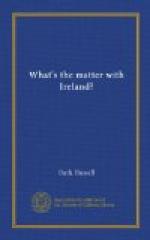Miss Pankhurst made an unexpected jump from her place. She wedged her way to the line of soldiers. As she talked to two young Tommies they blushed and fiddled with their bayonets like girls with their first bouquets of flowers. Twice a British major admonished them.
Miss Pankhurst, returning: “Welsh boys. Just babies. I asked them why they came out armed to kill fellow workers. They said they had enlisted for the war. If they had known they were to be sent to Ireland they would have refused to go. I told them it was not too late to act. They could take off their uniforms. But they? They’re weak—weak.”
As dusk fell, party capes and tulle mists of head dresses began to appear between the drab or tattered suits of the bystanders. Among the coming reception guests was Susan Mitchell, co-editor with George Russell on The Irish Homestead.
Susan Mitchell, of constable: “Can’t I go through? No? But there’s to be a party, and the tea will get all cold.”
In the courage of the crowd, the people began to sing The Soldiers’ Song. It took courage. It was shortly after John O’Sheehan had been sentenced for two years for caroling another seditious lyric. A surge of sound brought out the words: “The west’s awake!” Dying yokes. And a sudden right-about-face movement of the throng.
Crowd shouting: “Up the Americans!”
With Sinn Fein and American flags flying, the delegates’ car rolled up to the outskirts of the crowd. A sharp order. The crowd-fearing bayonets lunged forward. Frank Walsh, looking through his tortoise-rim glasses at the steel fence, got out of his car. He walked up to the pointing bayonets, and asked for the man in charge.
Frank Walsh: “What’s the row?”
The casualness of the question must have disarmed Lieutenant-Colonel Johnstone of the Dublin Military Police. He laughed. Then conferred. While the confab was on, the Countess Markewicz slipped from Mr. Walsh’s car to our paling. She was, as usual, dressed in a “prepared” style. She had on her green tweed suit with biscuits in the pockets, “so if anything happened.”
Countess Markewicz, rubbing her hands: “Excellent propaganda! Excellent propaganda!”
The motor lorries chugged. Soldiers broke line, and climbed in. The people screamed, jumped, waved their hands, and hurrahed for Walsh. Mr. Walsh returned to his car. And in the path made by the heartily boohed motor lorries, the American’s machine commenced its victorious passage to the Mansion House. In order to get through the crowd to the reception we sprang to the rear of the motor. Clinging to the dusty mudguard, I remarked to Miss Pankhurst that we would not look very partified. And she, pushed about by the tattered people, said she did not mind. Long ago she had decided she would never wear evening dresses because poor people never have them.
Last act. Turkish-rugged and velvet-portiered reception room of the Mansion House. Assorted people shaking hands with the delegates. Delegates filled with boyish glee at the stagey turn of events.




